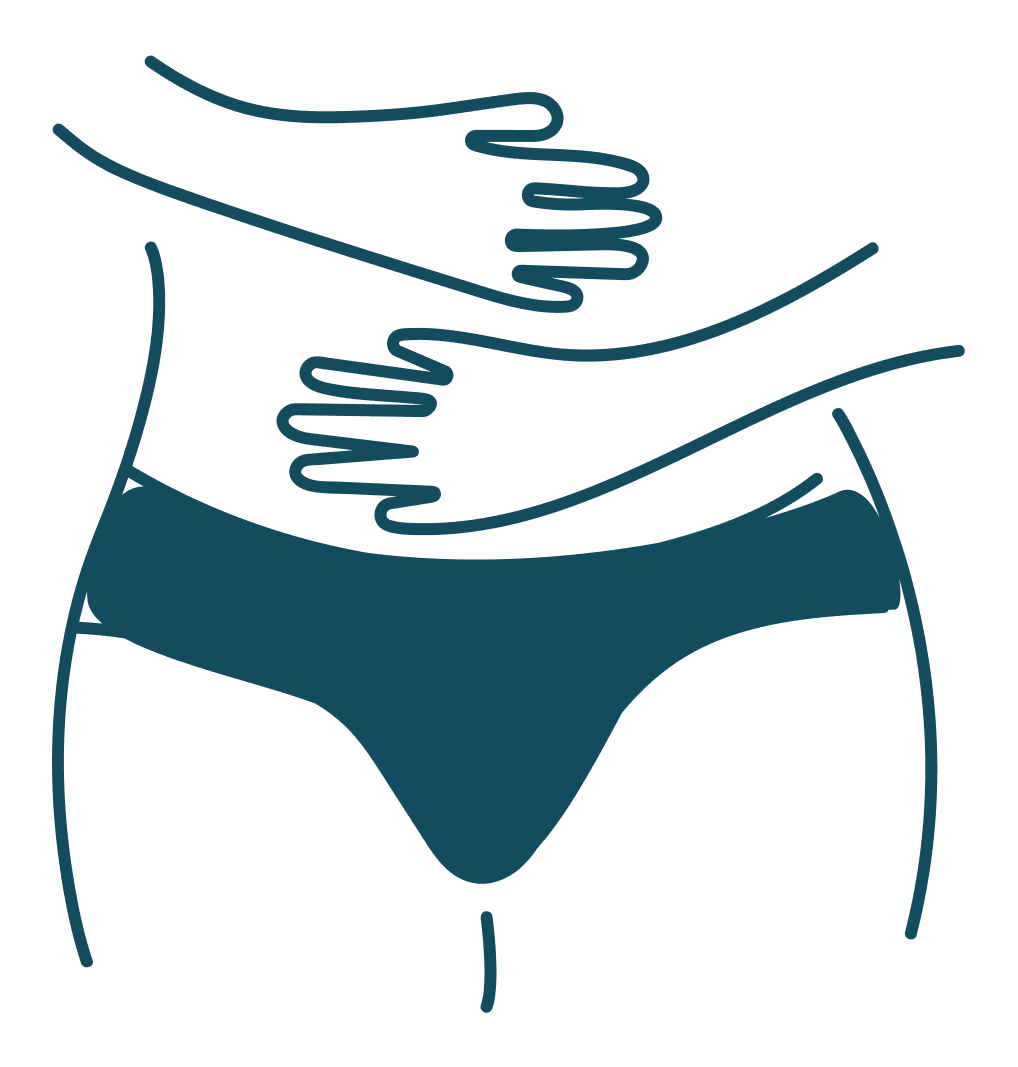⏱ 4 Min Read
The link between gynae conditions and IBS
Written by
Eleni Stefanou
Medically reviewed by
Dr Dupe Burgess, BSc, MBBS, MRCP
Updated on
22 Nov 2023
Irritable bowel syndrome (IBS) is a complex, chronic disorder that affects your digestive system. You might be diagnosed with IBS if you experience stomach pain or discomfort for at least three months and also notice your bowel habits changing (1). While a sizeable 12% of the UK population (2) is affected by IBS, its exact cause is still unclear.
Stomach pain or cramps
Diarrhoea
Bloating (feeling full in your belly)
Constipation (having three or fewer bowel movements a week, and/or difficulty passing stools)
Urgency (needing to go to the toilet quickly)
Feeling like you haven’t fully emptied your bowels after pooing

IBS is more common in women and affects between 14-24% of the female population (3). One hypothesis is that oestrogen, which women have higher levels of, plays a role in the condition. This hormone has been shown to influence the movement of food through the digestive system as well as the experience of pain in soft organs located in your chest, abdomen and pelvis. (4)
Women with IBS tend to report additional symptoms, including fatigue, backache, and insomnia and may also be more sensitive to particular foods around their period, for example, gas-producing foods such as beans. (5) During the luteal phase (before your period arrives), women with IBS may experience increased stomach pain and diarrhoea, whereas during ovulation (when the egg is released from the ovaries), they may experience more bloating and constipation.
While IBS isn’t life-threatening, it can significantly impact your quality of life, especially if it increases your stress levels, which we know can affect long-term health. There is also a possibility that your symptoms are linked to an underlying condition that needs to be treated.
For these reasons, if you’re experiencing symptoms that are negatively impacting you, or if you’re feeling concerned about them, it’s a good idea to visit your GP. There is no test for IBS, so the doctor will want to assess your symptoms and rule out other conditions first.
The exact cause of IBS is still unknown. Research points to a combination of factors, including:
Inflammation in the gut
Muscle abnormalities that affect the gut’s ability to digest food
Changes in the nerves that control the digestive system
Changes in the balance of bacteria in the gut microbiome (the collection of microorganisms living inside your gut)
An under-active or over-active immune system
Hormonal changes
Psychological factors such as stress, anxiety, and depression
The contraceptive pill
Infections
A major study (6) found that the same genetic make-up that puts people at an increased risk of IBS also increases the risk for mood and anxiety disorders. This doesn’t mean that anxiety causes IBS symptoms or that IBS causes anxiety. Instead, professor Miles Parkes from the University of Cambridge, explains that IBS and anxiety have shared genetic origins and that this could lead to "physical changes in brain or nerve cells that in turn cause symptoms in the brain and symptoms in the gut.”
Before diagnosing you with IBS, a doctor should make sure that there aren’t other disruptions causing your symptoms. Here is a list of conditions that could be ‘mimicking’ IBS:
Over 50% of women with IBS also experience gynaecological symptoms (3). Because IBS and women’s health conditions share similar symptoms (eg stomach pain), it can be difficult to know whether a symptom is caused by IBS or a gynae condition. While we need more research in this area, studies suggest that IBS may be linked to the following gynaecological conditions.
PCOS
A study found that 42% of women who had PCOS (polycystic ovary syndrome) also suffered from IBS (7). This link isn’t fully understood, but a few key players have been identified:
PCOS is associated with a higher level of androgens, which could also be responsible for causing IBS.
Similarly, PCOS is linked to chronic inflammation, which could lead to the development of IBS (8).
Women suffering from PCOS also tend to have a higher BMI, which is believed to exacerbate IBS (9). However, the evidence regarding this is still quite conflicting.
Chronic pelvic pain
Chronic pelvic pain (CPP) is the most commonly reported condition in women and often comes hand-in-hand with IBS, due to the similarity of symptoms. In fact, a study reported that approximately 50% of women who experienced stomach pain also had symptoms that matched those of IBS (10). We still don’t fully understand the relationship between IBS and CPP, and whether they are totally separate conditions or part of the same one.
Endometriosis
A study found that women with endometriosis are 4.2% more likely to be diagnosed with IBS (11). Researchers believe that IBS and endometriosis mutually promote each other, creating a positive feedback loop. Both share similar symptoms and produce similar effects (for example, chronic inflammation is a common feature in both conditions). By treating endometriosis, IBS symptoms can also be impacted and vice versa, further suggesting that the two are closely connected (12).
Researchers hypothesise that IBS could be linked to changes in your gut microbiome (13) and ‘leaky gut’ (when an unhealthy gut lining allows toxins and bugs to permeate it) (14). Both of these states can lead to inflammation, which could exacerbate both IBS and endometriosis symptoms and potentially even cause them in the first place.
Painful sex and decreased sex drive
A sometimes overlooked symptom of IBS is its impact on sex. In a study of people with functional gastrointestinal disorders, including IBS, 43.3% said they experienced sexual dysfunction, including painful sex (15).
Because of the multiple factors at play, IBS can be a complex condition to treat, so it’s important to find a solution that’s specifically tailored to you. Below are some common strategies used to manage symptoms:
Adjusting your diet
Keep a diary of what you eat and note when you experience IBS symptoms. It’s also useful to track this against your menstrual cycle to see if you experience worsening symptoms at a particular time of the month (for example, before your bleed days). If you notice something might be triggering your IBS, you can eliminate it or reduce it to see if your symptoms improve.
If it’s an option, partnering with a nutritionist can help you navigate this process (ask your GP for a referral). They may suggest following the low FODMAP diet, which you can learn more about in this NHS video about IBS and diet.
Reducing alcohol consumption
A study (16) found that when women with IBS drunk four or more alcohol-containing drinks in a day, their symptoms worsened. This link was strongest in women whose predominant IBS symptoms were diarrhea, constipation or a mix of symptoms. If you notice your symptoms worsening after drinking alcohol, see how reducing or eliminating it may impact your IBS.
Mind-body therapies
IBS doesn’t stop with your gut - it affects your whole body. Stress, anxiety and depression can all exacerbate and contribute to IBS, which means taking care of your mental health can help relieve your symptoms (and vice versa).
There are apps specifically designed to help manage IBS symptoms (search ‘IBS’ in the App/Play store). Some people also find the following methods helpful:
Hypnotherapy
Cognitive-behavioural therapy (CBT)
Acupuncture
Herbal remedies
While the effectiveness of herbal remedies for IBS still needs further investigation, the following herbs have shown some efficacy in relieving IBS symptoms (17):
Peppermint
Turmeric
Artichoke leaf
Chamomile flower
Liquorice root
Angelica root
Caraway fruit
Milk thistle fruit
Melissa leaf
Celandine herb
Bitter candytuft
Medication
IBS can be diarrhoea-predominant, constipation-predominant or a mix of both. There are groups of medications that target each of these ‘types’ of IBS, so ask your doctor for guidance on which medication may relieve your specific symptoms.
1. Diagnosis can be complex
If you’re experiencing IBS-like symptoms, there’s a chance it could be something else. Make sure you check in with your doctor so they can rule out other conditions.
2. Monitor your symptoms + cycle
Women can experience additional symptoms including fatigue, backache, and insomnia. If you experience these, along with any food sensitivities or symptoms that fluctuate with your menstrual cycle (eg more constipation when ovulating), mention this to your doctor as well.
3. Remember the brain-gut connection
We know that IBS is linked to inflammation and that your brain and digestive system work closely together. This means that addressing your mental and physical health (particularly what you eat) can significantly improve your IBS symptoms.
4. Don't suffer in silence
Living with IBS can be lonely. Joining a support group can go a long way in accessing the care you need. The IBS Network is a great place to start.
References
(1). Irritable Bowel Syndrome: Current and Emerging Treatment Options (Published: 2014. Authors: Lauren Peyton, and Joy Greene)
(2). Burden of irritable bowel syndrome in an increasingly cost-aware National Health Service (Published: 2015. Authors: Anet Soubieres, Patrick Wilson, Andrew Poullis, Julia Wilkins, and Mark Rance)
(3). Women and Irritable Bowel Syndrome (IBS) (Author: UNC Center for Functional GI and Motility Disorders)
(4). Sex difference in irritable bowel syndrome: do gonadal hormones play a role? (Published: 2010. Authors: Agata Mulak and Yvette Taché)
(5). Gynecological Aspects of Irritable Bowel Syndrome (Published: 2001, Updated: 2021. Authors: Margaret M. Heitkemper, and Monica Jarett)
(6). Genome-wide analysis of 53,400 people with irritable bowel syndrome highlights shared genetic pathways with mood and anxiety disorders (Published: 2021. Authors: Chris Eijsbouts, Tenghao Zheng, Nicholas A. Kennedy, Ferdinando Bonfiglio, Carl A. Anderson, Loukas Moutsianas)
(7). Polycystic Ovary Syndrome Is Associated with an Increased Prevalence of Irritable Bowel Syndrome (Published: 2009. Authors: Ruchi Mathur, Ara Ko, Laura J. Hwang, Kimberly Low, Ricardo Azziz & Mark Pimentel)
(8). The role of inflammation in irritable bowel syndrome (IBS) (Published: 2018. Authors: Qin Xiang Ng, Alex Yu Sen Soh, Wayren Loke, Donovan Yutong Lim, and Wee-Song Yeo)
(9). Obesity and Irritable Bowel Syndrome: A Comprehensive Review (Published: 2014. Authors: Octavia Pickett-Blakely)
(10). Gynaecological consultation in patients with the irritable bowel syndrome (Published: 1989. Authors: A Prior, P J Whorwell)
(11). The risk of irritable bowel syndrome in patients with endometriosis during a 5-year follow-up: a nationwide population-based cohort study (Published: 2015. Authors: Chen-Yi Wu, Wei-Pin Chang, Yen-Hou Chang, Chung-Pin Li & Chi-Mu Chuang)
(12). Irritable bowel syndrome and endometriosis: New insights for old diseases (Published: 2018. Authors: Davide Viganòa, Federica Zaraa, Paolo Usaia)
(13). The gut microbiota: a puppet master in the pathogenesis of endometriosis? (Published: 2016. Authors: Laschke MW, Menger MD)
(14). Tight junctions and IBS - the link between epithelial permeability, low-grade inflammation, and symptom generation? (Published: 2014. Authors: Piche T)
(15). Sexual dysfunction in patients with Irritable Bowel Syndrome (IBS) and Non-Ulcer Dyspepsia (NUD) (Published: 1995. Authors: Fass R, Fullerton S, Diehl DL, Hirsh T, Mayer EA)
(16). Relationship between patterns of alcohol consumption and gastrointestinal symptoms among patients with irritable bowel syndrome (Published: Authors: Kerryn W Reding, Kevin C Cain, Monica E Jarrett, Margaret D Eugenio, Margaret M Heitkemper)
(17). Management of Irritable Bowel Syndrome (IBS) in Adults: Conventional and Complementary/Alternative Approaches (Published: 2011. Authors: Saunjoo L. Yoon, Oliver Grundmann, Laura Koepp, Lana Farrell)
Care from the comfort of your home
When was the last time you felt truly heard by a healthcare professional? At Bloomful, our clinicians listen deeply, ask the right questions, and commit to helping you overcome the health hurdles that are holding you back.
